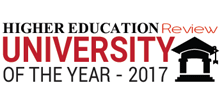Sir Padampat Singhania University: Reinventing The Idea Of Higher Education
By Ashok Ghosh, President
Based in the spellbinding land of Udaipur, which is popularly known as 'a magical marble mosaic', Sir Padampat Singhania University(SPSU)was commenced by Y.P. Singhania, grandson of the idealistic industrialist Late Sir Padampat Singhania, the founder of the JK Organization. Ranked as one of the leading universities of India in 2017 by MHRD, National Institute Ranking Framework(NIRF), SPSU is among the six private universities ranked in Rajasthan and the youngest institution to be so ranked. The University also bagged a place for itself amongst the top 100 universities in India of category "A" higher educational institutions in 2016 by NIRF.
"We have entrenched certain success parameters for ourselves,which we try to attain with the dedication of providing an education that combines rigorous academic study and the excitement of discovery with the support and intellectual stimulation of a diverse campus community," opines Ashok Ghosh, President,Sir Padampat Singhania University. Endowed with natural resources and beautiful landscape, the university campus is a treat for the students to stay in who get access to the avant-garde facilities. Each building in the campus is planned according to Stanford University's space management plan for Higher education.
Spread in more than 7.28lakh square feet of constructed area, the campus has well lit and ventilated classrooms, structured laboratories for each stream, including separate boys'and girls' hostels and spacious accommodation for staff and faculty. Giving downright emphasis on the security of the people residing within the campus, the Management has hired one of the best private security services in the country. The students of SPSU also get the space to spend time in sports and recreational activities through two spacious playgrounds, more than twelve courts and an open gym.
Being a student-driven university, there are 22 clubs in the campus, ranging from literary, dramatics, sports and technical domains. "The clubs form an integral part of SPSU and are conceptualized by the students and supervised by a faculty mentor. These are an initiative by the students to emphasize on developing their personality and providing wings to their creativity," explains Ghosh.
SPSU annually welcomes students from all over the country, promoting cultural diversity in the campus. The university is constituted of three schools viz. School of Engineering, School of Management and School of Basic Science & Humanities offering graduate, post-graduate and doctorate level courses to the students. "Our mission is to disseminate knowledge and educate students in science, technology, management and other areas that will best serve the nation and the world in the 21st century," shares Ghosh.
Elaborating on the prime teaching-learning module of the university, Ghosh adds, "To retain the zest for concept clearance and boost critical thinking among the student's, hands-on learning is a sure bet. Hence, we at SPSU have adopted the learning by doing approach as 'blended learning' is a concept that is fast gaining pace in the Indian education context." Given this, SPSU has initiated a number of industry partnership with companies like Hitachi Rail Systems (Japan), CISCO Network Academy, Valuer HR and so on where the students get an exposure to a professional scenario through maximum industrial visits. Addition to this, summer training has been made compulsory for the students where they are subjected to work in industries and companies and complete the projects assigned to them.
Having a bracket of qualified faculty members from diverse fields, SPSU has initiated collaboration with several educational set-ups such as University of Gothenburg (Sweden), Chiba University of Commerce (Japan), University of Nebraska(USA), just to name a few, for providing international exposures to faculty and students. The enhancement of the faculty members' knowledge at SPSU is given equivalent priority compared to students as the management believes that teachers are the primary source of transmitting quality education.
"We encourage our faculty members to actively engage in research activities and provide sabbatical leave to the faculty members to carry out such research projects," claims Ghosh. Owing to this, SPSU has earned 15 patents and a large number of publications in journals and conference proceedings, out of which 75 have been published in international journals indexed in Scopus and Web of Science. Running rigorous Doctoral degree programme, till date, twenty scholars registered in the School of Engineering and School of Management have been awarded Ph.D. degree by the university.
Apart from research,another thrust area of higher education today isentrepreneurship. Recognizing this,the university has initiated a Business Incubator,aiming at administrating suitable environment and infrastructural support to the furthermore associated with AMCAT for assessing general aptitude, behavioral traits and communication skills of the students as per industry requirements.
By the end of the course, the students of SPSU gain a holistic development by getting the opportunity to dip into a balanced knowledge pool offered by the university. The recruiter visiting the campus hence acknowledges the capabilities of the students and offers the best positions to them. In 2017, the campus greeted companies like JBM Group, NIIT Technologies, Collabera, JK Cement Ltd., Rajasthan Govt. Yuva Vikas Prerak, Valuer HR and so on with average package of 3 lakhs. The alumni are considered as the ambassadors of the university who are always keen to generate internships and placement opportunities for the ongoing students. "We anticipate to be a leader in the academic initiatives in higher education and be a multi-discipline university and deliver research-informed teaching thereby fostering a culture of independent learning, critical thinking, and enterprise," concludes Ghosh.
"We have entrenched certain success parameters for ourselves,which we try to attain with the dedication of providing an education that combines rigorous academic study and the excitement of discovery with the support and intellectual stimulation of a diverse campus community," opines Ashok Ghosh, President,Sir Padampat Singhania University. Endowed with natural resources and beautiful landscape, the university campus is a treat for the students to stay in who get access to the avant-garde facilities. Each building in the campus is planned according to Stanford University's space management plan for Higher education.
Spread in more than 7.28lakh square feet of constructed area, the campus has well lit and ventilated classrooms, structured laboratories for each stream, including separate boys'and girls' hostels and spacious accommodation for staff and faculty. Giving downright emphasis on the security of the people residing within the campus, the Management has hired one of the best private security services in the country. The students of SPSU also get the space to spend time in sports and recreational activities through two spacious playgrounds, more than twelve courts and an open gym.
Being a student-driven university, there are 22 clubs in the campus, ranging from literary, dramatics, sports and technical domains. "The clubs form an integral part of SPSU and are conceptualized by the students and supervised by a faculty mentor. These are an initiative by the students to emphasize on developing their personality and providing wings to their creativity," explains Ghosh.
"SPSU annually welcomes students from all over the country, promoting cultural diversity in the campus"
Keeping Pace with Emerging Areas
SPSU annually welcomes students from all over the country, promoting cultural diversity in the campus. The university is constituted of three schools viz. School of Engineering, School of Management and School of Basic Science & Humanities offering graduate, post-graduate and doctorate level courses to the students. "Our mission is to disseminate knowledge and educate students in science, technology, management and other areas that will best serve the nation and the world in the 21st century," shares Ghosh.
Elaborating on the prime teaching-learning module of the university, Ghosh adds, "To retain the zest for concept clearance and boost critical thinking among the student's, hands-on learning is a sure bet. Hence, we at SPSU have adopted the learning by doing approach as 'blended learning' is a concept that is fast gaining pace in the Indian education context." Given this, SPSU has initiated a number of industry partnership with companies like Hitachi Rail Systems (Japan), CISCO Network Academy, Valuer HR and so on where the students get an exposure to a professional scenario through maximum industrial visits. Addition to this, summer training has been made compulsory for the students where they are subjected to work in industries and companies and complete the projects assigned to them.
Having a bracket of qualified faculty members from diverse fields, SPSU has initiated collaboration with several educational set-ups such as University of Gothenburg (Sweden), Chiba University of Commerce (Japan), University of Nebraska(USA), just to name a few, for providing international exposures to faculty and students. The enhancement of the faculty members' knowledge at SPSU is given equivalent priority compared to students as the management believes that teachers are the primary source of transmitting quality education.
"We encourage our faculty members to actively engage in research activities and provide sabbatical leave to the faculty members to carry out such research projects," claims Ghosh. Owing to this, SPSU has earned 15 patents and a large number of publications in journals and conference proceedings, out of which 75 have been published in international journals indexed in Scopus and Web of Science. Running rigorous Doctoral degree programme, till date, twenty scholars registered in the School of Engineering and School of Management have been awarded Ph.D. degree by the university.
Apart from research,another thrust area of higher education today isentrepreneurship. Recognizing this,the university has initiated a Business Incubator,aiming at administrating suitable environment and infrastructural support to the furthermore associated with AMCAT for assessing general aptitude, behavioral traits and communication skills of the students as per industry requirements.
By the end of the course, the students of SPSU gain a holistic development by getting the opportunity to dip into a balanced knowledge pool offered by the university. The recruiter visiting the campus hence acknowledges the capabilities of the students and offers the best positions to them. In 2017, the campus greeted companies like JBM Group, NIIT Technologies, Collabera, JK Cement Ltd., Rajasthan Govt. Yuva Vikas Prerak, Valuer HR and so on with average package of 3 lakhs. The alumni are considered as the ambassadors of the university who are always keen to generate internships and placement opportunities for the ongoing students. "We anticipate to be a leader in the academic initiatives in higher education and be a multi-discipline university and deliver research-informed teaching thereby fostering a culture of independent learning, critical thinking, and enterprise," concludes Ghosh.



